Norse mythology is filled with legendary beasts, both good and evil, none was richer than the dragon Fafnir. As is so often the case with great mythical beasts, it takes a hero to slay them. Indeed, Fafnir’s story is also the story of Sigurd, the dragon slayer.
The dwarf king Hreidmar had three sons: Otr, Regin and Fafnir. His hoard of wealth was legendary and his home was famous for its beautiful halls gilded with gemstones and precious metals.
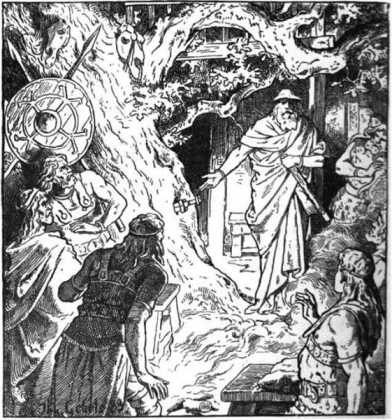
Otr was a skilled fisherman and sorcerer. He spent much of his time by the river exercising his magical skills by transforming himself into an otter to catch large quantities of fish.
Regin was a master smith and spent his time crafting metal and gemstones into bejeweled ornaments with which to adorn the family home.
Fafnir meanwhile, was the strongest and bravest of the three. To him, it fell the task of guarding the king’s treasure and protecting the royal halls.
The Death of Otr
One day while Otr was out catching fish in the river in his otter form, he was slain, inadvertently by a party of gods. Hreidmar was greatly enraged at the affront and pained for the loss of his son. The guilty group, however, included none other than Odin, Hoenir, and Loki.
Unable to take vengeance directly, and also spying an opportunity for enrichment, the dwarf king demanded instead a ransom that only such as Odin could pay. Once delivered, his already considerable wealth was vastly increased and his hoard an even greater target for those who would have it.
The Curse of the Ring
Hreidmar however, did not count on the origins of the treasure he received. Odin did not gift the dwarf king his own gold but wrested it instead from the dwarf Andvari together with his magical wealth-producing ring, the Andvaranaut.
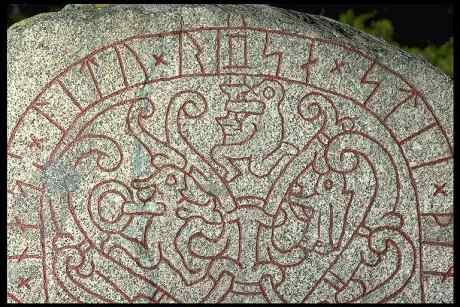
Unhappy with the loss of his treasure Andvari cursed both treasure and ring so that anyone who possessed them would surely find death before happiness in this world.
Now shall the gold that Gust once had
Bring their death to brothers twain,
And evil be for heroes eight;
joy of my wealth shall no man win.
The Death of Hreidmar
Oblivious to the curse Hreidmar accepted the trove as blood money for his slain son. His already prodigious hoard of wealth swelled to vast proportions and it was not long before his remaining sons began to envy their father’s riches.
Although charged with guarding his father’s property, Fafnir grew daily more resentful that the king did not part with more in recompense for his duties. Not content with one day receiving his share through lawful inheritance, he convinced his brother Regin, that the gold should belong to them all at once.
Thus it was that the brothers conspired to kill their father and king. When it came to the moment of truth, it was Fafnir’s strong right arm, once trusted to protect the royal home, that slew the king and stole a prince’s ransom.
Fafnir the Dragon
Now within his grasp, the love of treasure overtook Fafnir, and he used magic to transform into a dragon the better to guard his gold. As a dwarf, his ability to hoard the wealth was limited, but in dragon form he might sit upon the store day and night to ensure that no coin, gem, or artifact should ever be stolen.
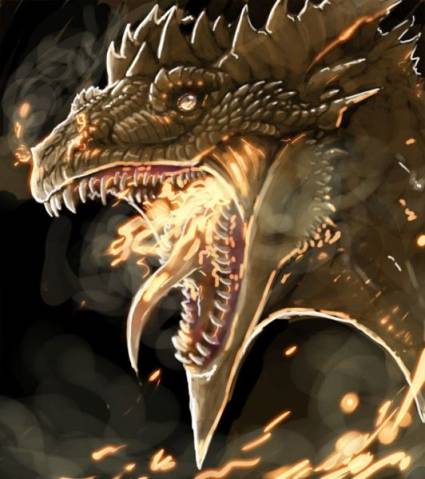
It was obvious to him now that the wealth was his and his alone. It was not his brother Regin who undertook the bloody work of slaying a king, nor was it Regin who guarded the treasure steadfastly with his own body.
Thus it was that the treasure of a kingdom became a dragon’s hoard.
Being the sole owner of his father’s wealth, including the ring and gold paid for his brother Otr, the curse of Andvari now passed to Fafnir himself, and dragon or not, the bane would have its way.
Sigurd’s Blade
The years passed, but Fafnir never tired of his wealth, taking pleasure daily in its possession while ever fearing its loss. Regin, for his part, could not forget the loss of his birthright and dreamed of regaining what was rightfully his.
He welcomed into his home one Sigurd son of Sigmund and treated the boy as his own son, plotting one day to have the young hero slay his dragon brother in his stead.
Hither the son of Sigmund is come,
The hero eager, here to our hall;
His courage is more than an ancient man’s,
And battle I hope from the hardy wolf.
The former prince was a master smith beyond all human skill and so it was he made a bargain with Sigurd that he would forge him a sword strong enough to slay a dragon if he would vow to use it to end Fafnir’s reign.
The pact was sworn and soon the sword, named Gram was ready to be tested. Sigurd swung the new blade in the confines of Regin’s forge and in one clean arc clove his smith’s anvil in two equal parts. Astonished at the dwarf’s skill, he was fully ready to keep his oath.
Odin Son and Odin’s Steed
The two set out together for Fafnir’s barren homeland and from his high vantage point in Asgard, the all-seeing Odin observed their progress. The highest of gods in his wisdom deigned to help the foolhardy yet brave hero.
Appearing to Sigurd in the forest, Odin gifted him a steed named Grani. The magnificent horse was a child of Sleipnir and possessed of a light-filled mane. Thus favored, Sigurd and Regin continued on towards their goal.
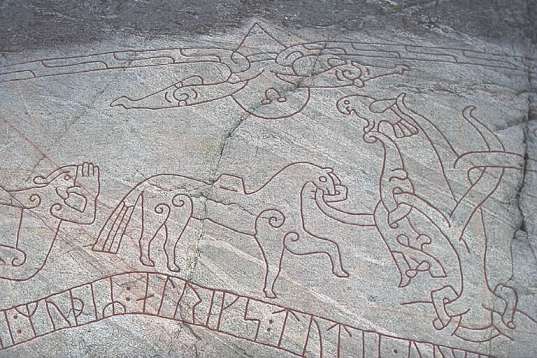
For seven days the pair journeyed through a thick forest, with wolves and other animals howling in the night. But none dared to approach them for fear of the great beams of light thrown off by Grani’s flashing mane.
At last on the eighth day, the forest subsided and the travelers emerged into a barren plain. A day’s further travel brought them to a high and endless wall. Surveying the great barrier Regin declared to Sigurd that it was beyond this border that he would find the dragon’s lair.
Entering the Dragons lair
Scaling the height was no easy feat, but at last from atop the wall, the pair laid eyes far in the distance upon the sleeping Fafnir. Seeing his brother once more Regin’s courage began to fail him, for upon the dragon’s head lay the Helm of Terror, inscribed with a powerful rune to instill fear in his enemies.
The dwarf’s resolve slipped away and he asked Sigurd if they should not give up their cause and return to their easy life at home. The hero retorted that Regin might retreat if he would and vowed that for his part, the task would be complete by sundown. True to his word Sigurd descended the wall leaving Grani and the trembling Regin behind.
Sigurd and the Boatman
Making directly to where the dragon slumbered he encountered a river that blocked his way. All at once where the air was clear a mist appeared shrouding the water and the bank beyond.
As he stood on the water’s edge contemplating how best to pass over, a boat emerged from the gloom and a boatman called out, inquiring what manner of traveler it was who would make so rash a crossing.
Sigurd announced his name and mission, stating that he would kill the dragon that lay beyond. The boatman invited him to alight and as they crossed the water inquired how the young hero planned to accomplish so great a task.
Sigurd answered that he would cut the beast open using Regin’s blade.
The boatman laughed and insisted that a mere sword would not suffice to end the life of such as Fafnir. The beast breathed poison, shot forth bolts of lightning from his eyes, and his body was covered with impenetrable scales. Beyond all of this, he also wore upon his brow the Helmet of Terror.
Odins Advice to Sigurd
Sigurd undeterred shook his head and said that he would go onward and that a way he would find nonetheless. Impressed by his courage the boatman offered him council on how the deed might be done.
There was a path to the river, he said, well worn by Fafnir from his daily morning trek to quench his thirst. If Sigurd would dig a narrow pit into this path, he might hide there until morning and then plunge his weapon into the dragon’s soft underbelly as it passed over.
The boat now reaching the other side Sigurd leaped ashore and turned to thank the man for his advice. The boatman and his vessel, however, had vanished without a trace. Surely, he thought, this was Odin come to bless his mission once more.
The Death of Fafnir
Emboldened by this favor of the Allfather, Sigurd acted according to the council he had received. He dug a cold pit and waited there until morning began to break. A first light a great roar was heard filling the skies above him.
Sigurd readied himself and as the vast shadow cast by the dragon approached he raised the sword high up, plunging it deep into Fafnir’s innards. As the dragon flew on he fought to hold his ground and tore the beast open from gizzard to loin.
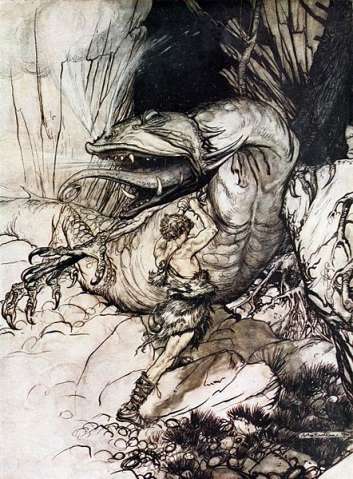
With a thunderous crash, the monstrous body fell dying to the ground. Emerging from the pit Sigurd revealed himself and Fafnir called out to know who had injured him so gravely.
Youth, oh, youth!
of whom then, youth, art thou born?
Say whose son thou art,
Who in Fafnir’s blood
thy bright blade reddened,
And struck thy sword to my heart.
Sigurd divulged his name and motive for the deed. In his dying moments Fafnir, knowing his end was near, imparted much knowledge to the young hero. He explained many mysteries that are unknown to common mortals.
Fafnirs Warning to Sigurd
His final words held also a warning for the hero, that his brother Regin would surely betray him. Explaining that the hoard of gold now belonging to Sigurd carried with it a dwarfish curse.
Regin betrayed me,
and thee will betray,
Us both to death will he bring;
His life, methinks,
must Fafnir lose,
For the mightier man wast thou.
With these final words the great beast expired and Regin, from the shadows appeared once more. The sight of the gold and Andvari’s ring awoken the desire to possess all that he considered his birthright.
He praised Sigurd for the deed but added that without the blade he forged, he would have been helpless. Sigurd retorted that courage by his reckoning was more important than any weapon forged by man or dwarf.
Dismissing their exchange Regin carved out Fafnir’s heart, named Rithil, to drink deeply of his brother’s blood. He then commanded Sigurd to cook the offal for his meal.
As the dwarf slept Sigurd set to preparing the meat but by an accident, a drop of the blood entered his mouth. Instantly the ability to understand the language of birds was conferred upon him. In their conversation, he heard again that Regin would betray him.
Asking their council the birds agreed that if Sigurd would obtain life and wisdom that he should cook and eat the dragon’s heart himself and slay the treacherous dwarf where he lay.
Without hesitation, Sigurd lopped off the sleeping dwarf’s head. For good measure, he drank both his blood and that of his cursed brother. Next he consumed Rithil, the wisdom-giving dragon heart.
And so ends the tale of Fafnir the dragon.
FAQs
Is Fafnir a god?
Fafnir was a dwarf of royal descent before he became a dragon. Although strong, brave, and gifted with knowledge of magic, he was never a god.
How did Fafnir become a dragon?
Fafnir, like his brothers and his father, was a sorcerer as well as a prince. His brother Otr could easily transform himself into an otter to catch fish in the river. Like his brothers Regin could forge a sword so powerful as to split an anvil in two.
He used magic to turn himself into a dragon. As a dragon he could protect his hoard of gold night and day by sleeping on top of it.
Why did Odin help Sigurd?
It is possible, though not conclusive, that Sigurd was a son of Odin. The Allfather also had good reason to dislike Fafnir who was a source of misery to the people of Midgard.
Is Fafnir good?
As a young dwarf, he was known for his bravery and was tasked with protecting his household. As the years wore on he grew avaricious and plotted with his brother to steal their father’s wealth. After murdering his king and father, he then stole all the gold for himself and banished his brother.
